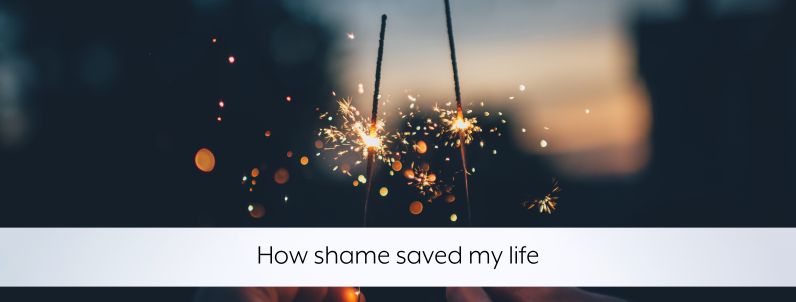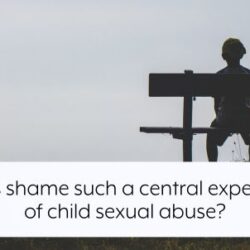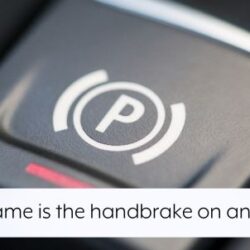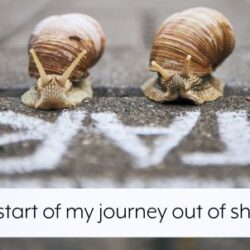
What if shame is nothing to be ashamed of … but instead is the hero in our story?
Even as I write it, my head is twisting inside-out, upside-down to get used to the idea. But it’s something I’ve come to firmly believe is true, no matter how counter-intuitive it may feel.
I grew up as shame incarnate. I was bad – that was plain to see. I was beyond hope. And I knew that I didn’t fit in, that no one liked me, that no one would ever love me. The constant slurry of self-disgust filling my guts was as normal as my daily nausea. I literally found myself sickening.
How can someone grow up to feel so out of place in the world, so wrong, so bad, so unwanted?
Unfortunately, I’m not alone. Not only does active abuse make us feel intrinsically toxic, but emotional neglect can do so as well. After all, what is more shameful than not being loved by the very person who gave birth to you and on whose benevolence you are totally dependent for your survival?
At school I didn’t get on easily with other kids. I didn’t understand them; they certainly didn’t understand me. I felt like I ought to keep my distance; I assumed that they didn’t like me, and a lot of the time I was right. I saw the cool kids, the nice kids, and the popular kids and they had an ease about them, even about the way they moved their bodies. I felt by contrast like a malfunctioning robot, moving jerkily through life, failing to compute the right thing to say or the right thing to do.
By the time I started therapy in my early thirties, I was sick to death of my shame. I was sick to death of being me. I just hated myself. Because everything in me was wrong. I was tethered up within myself with shamefulness.
So therapy didn’t start well when the issue of shame was first raised. Oh no, I thought, she’s noticed. And here’s something else I’m crap at. I’m full of shame, and she’s seen it. Something else that is wrong with me.
I couldn’t understand how other people could live without shame. I couldn’t understand why they didn’t cringe at the sound of their own voice, or gag at the sight of their own reflection. I couldn’t understand why some were happy to be the centre of attention – even quietly at the centre, not in a raucous, narcissistic way. They didn’t mind people talking to them. They didn’t mind people noticing them. I couldn’t think of anything worse.
And I was stuck. I had one great dream: to be a writer. It involved being noticed. I wanted to throw up at the mere thought of it.
So, shamefully, I began to explore in therapy why I was so ashamed. But the more we talked about it, the worse it became. All it seemed to do was point out how crap and shameful I was. It increased my sense of inadequacy. I despaired of ever feeling any different.
And then.
Sometimes, breakthroughs come at the most unexpected times and in colours and flavours we couldn’t have anticipated. This breakthrough came in the form of a sliver of understanding about the role of shame in our survival. It was such a distinct, inside-exploding moment: a completely different way of looking at the problem, and even of looking at myself. All was not lost after all.
I understood for the first time that shame had kept me alive.
The feelings of shame, the reactions in my body of shame, were not evidence of my shamefulness; rather they were unconscious attempts to navigate a world in which people attacked and hurt me. If I huddle small into a ball, if I slump my shoulders and avert my gaze, if I take the blame and submit, perhaps I will survive.
Shame accomplished two things: it ensured that I was angry only at myself, rather than at my abusers, thereby containing my rage and keeping me safe from the consequences of expressing that anger. And it explained the world to me, in a way that prepared me for further maltreatment – I was bad; therefore I could expect to be treated badly; therefore I would be prepared for the next, inevitable wave of hatred and malevolence from others.
It was brilliant, simply brilliant. What better way to survive continual childhood abuse? What better way to keep myself as safe as possible, so that I could live to fight another day?
The problem was that I had become stuck. I hadn’t move on to fight another day. I was stuck in the freeze posture of shame, anticipating the next blow and bracing myself to withstand it. By continually hating myself, I put myself in a state of readiness, anticipating the hatred of others, so that it would never come as a shock when I was rejected, or bullied, or criticised, or abused.
At the same time, my hatred-habituated brain interpreted the actions and motives of others as consistent with my view of myself: they must hate me, because I hate myself; they must be out to hurt me, because I deserve to be hurt; they can’t want to befriend me, because I have only enemies. I interpreted every approach by others through this lens of shame, in a way that validated my shame-based view of myself, but which led to a deeply lonely and isolated existence.
This overpowering, nauseating shame that I lived with was trying to keep me safe. It was an attempt to submit and take the blame, to minimise the pain. It was an attempt to huddle small and still, so as not to provoke my attackers. It was trying to protect me.
It was like dawn bursting on a mountainside. The thought occurred to me – novel, fantastical – that maybe there wasn’t anything actually, truly wrong with me after all. Maybe that was just a belief that had served to help me through the abuse. Maybe, just maybe, I could see my beliefs about my unworthiness, my rottenness, my badness, my non-worth, as attempts to survive rather than reflections of reality.
Oh, oh, oh …
What if this were true?
What if I were not bad, incorrigible, evil, pathetic, worthless? What if my abusers were, and I was just taking on their worldview, subscribing to their ideology, as a way of surviving a world where they held the power? Like citizens in a dictatorship, where it’s better to bow your head and hail the evil empire, than to rise against it, while you have no power?
Even thinking these things made me nervous. What if they know what I’m thinking …? Such was my terror, my submission to their regime, that even years later, as an adult, I felt clammy dread at the prospect of my rebellion.
Shame made so much sense in the light of this revelation. I had to be the bad one. I had to take the blame. I had to bow my head, and scrape along the floor, in obsequious servility. It was the only way to survive.
But now … but now …
It felt like, for the first time in my life, I was standing up and straightening my spine. I still heard my internal voices, telling me it wasn’t safe, that I would get hurt, that I would get shot down. Who do you think you are, to think that you’re not bad? Who do you think you are, to think you’re not to blame?
But for the first time, rather than believing those voices, I began to see them as attempts to warn me, to keep me safe. I’m not bad, I replied, with a glint of joy in my voice. I’m not bad – THEY are. I’m not wrong – THEY are. I have nothing to be ashamed of.
Oh, what a thought! Oh, if that were true!
And over the intervening years, I’ve learned to believe that it is true. I took the blame while it was adaptive to do so. I refuse to take it any more.
I’m no longer ashamed of being ashamed. Shame kept me alive. What a hero, what a friend.



14 Comments
I’m so glad you worked through your shame in therapy enough to adequately process it, explain the adaptive benefits of it, and break through to the other side of it. If you had allowed shame to continue to dictate your life choices and it suceed in preventing you achieving your goal to write and be noticed, the trauma survivor world would have missed out on your vital messages. I’ve heard you speak Carolyn and know how valuable your words are to listen to. I am so angry at the abusers who tried to selfishly rob you of your self-worth. I’m so glad you haven’t let them win, and that you are here to inspire other survivors like me to do the same. Your ‘recovery is my best revenge’ book was the most valuable book I read when I was suicidal. I can’t describe how much your writing helped me, so to think you almost didn’t write at all is tragic. I’m so glad you’re now blogging regularly too! Imani.
I read with wonder your blog on shame. It could have been me writing about shame, and what it feels like . I saw myself as if in a mirror. I will read this over and over until I can accept my shame. What a glorious, freeing concept! Thank you so much for sharing your pain with us, how lucky I was to have found you!
Moana
I’ve read this post a couple of times now and I’ve written a reply each time but I don’t seem to push the right buttons to get my reply through.
All I wanted to say is I’ve never thought of shame in this way but I can see the point that you are making and how brilliant it is!
Shame has been my friend too, now that you put it like that. I can see the potential this piece of information has for those I work with. I can see a potential for empowerment by recognising the inner strength, resilience and adaptiveness. Skills we have all used to see life through to today.
Thank you for this fresh insight Carolyn, keep on writing.
Thank you for sharing your journey and your wonderful epiphany…… you are a source of comfort and an inspiration to many.
Thanks for your post on shame. I suffered from debilitating shame for many years after my abuse and it was only through therapy that I recovered from it. I still fight it some. It’s a battle I haven’t completely won as I still struggle to meet people and think that people will find me unacceptable. Because as my sisters used to say, I’m “weird” and who gets along with weird people? But I see from your post I am not weird, I am normal in that I responded to an abnormal situation in a normal fashion, by dissociating and becoming ashamed of who I was at every level. Your post helps me make better friends with my shame. it is not me who should be ashamed but those who harmed me.
I too am reminded of my own experiences whilst reading your generously, fearlessly shared experiences.
I am reminded of something I’d forgotten. A phase of saying “thank you, you can stand down, I’ve got this” to my fear/shame/inner child. I guess it worked so well that I forgot the usefulness of that phrase. Thank you for reminding me as I need it again. I’m gradually pushing through my fear of success. Like trying to give birth to myself all over again. I have Ashtanga yoga as my therapist too now. It has helped me find my determination. Much love ❤️
I am totally impressed with your writings. Have you ever heard Zoe Lodrick speak on shame? How you never take it away from a client as it keeps them afloat. She is one of the few who inspired me whilst working a t New Pathways, Merthyr.
Carolyn you have such a powerful way of connecting with both therapists and survivors. I value your blogs in my work with survivors and thank you for sharing your thoughts, beliefs and ways of coping. Thank you…
Thank you
I think I might try to befriend my shame too
I love your articles Carolyn. My question is, how do we stop the shame from making us submit in the present when it’s no longer adaptive? If anyone has the cure to not being able to say no until someone seriously CROSSES THE LINE OBVIOUSLY, then I would forever grateful to find out. Because unfortunately people who choose to abuse seem to smell out shame and use it against those who are too scared to defend them/ourselves, and whilst the world is no longer uncontrollable, how can we control the fear that shame drives, that fear of intrinsically attracting that which we would go through 7 hells to avoid?
It is not true, and I would never blame the victim… yet it’s easy to think but there’s people, and then there’s me…!
Can you,Caroline or others comment on my dilemma,I have no memory of the abuse that occurred under 2 years .After that as a carer of my traumatised mother my emotional needs were not met. After her remarriage I let go of being a carer and felt like a real child. An abusive marriage ended and I sought help. My question is as I have always denied feeling shame does that mean I knew it was not my fault in mý mind or that I was less protected.My predominant emotion is anger. What do you think?
My therapist has just sent me a link to this article on shame. I feel like someone has just turned on a small but bright light in the darkness – I know i have to re read it to understand it all properly but for now i am crying tears of relief because your words have touched the parts which have been feeling utterly stuck & despairing & knowing despite what people having been saying to me that i am fundamentally broken or was born defective in my core & can never hope to heal & be whole- thank you for that light.
such a good read – shame is habitual and so engrained in my wiring and EMDR is helping me get in touch with my shame. I lived years abandoned and unloved and often reviled, and I hated myself for it… I was ashamed that “that” was me, that I was such an unwantable/abandonable, unloved and repulsive chld, and my shame about that was a smuch a part of me as my hair and eye color. No one tells you “this shame is just for now, to survive this terrible time…” and when you are finally free no one tells you “ok, your free of them, you can stop being ashamed now…” We need to tell ourselves that, and then unlearn a whole way of life…. the only way of life we may have ever known. We need to unlearn the shame that helped us adapt and survive… in order to keep surviving. I used to be shame. Now there is a little me inside who is ashamed and I carry him with me, and I try to be thankful to him for taking the bullets back then so we could live now.